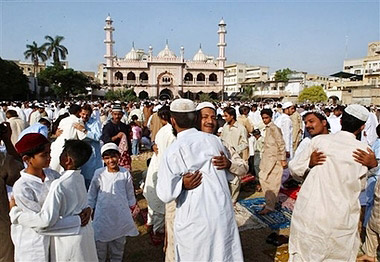Most of the living religions prescribe the keeping of fast for controlling bodily desires and mental fickleness. The month of Ramazan is observed in the ninth month, according to the Muslim calendar. A Muslim has to keep fast for the whole month except children, pregnant women, sick and very old men. A Muslim in order to observe fast does not take any food or water from dawn up to sunset every day during the month of Ramazan. He is also abstains from smoking and having sexual intercourse during the state of fasting. During the period of Ramazan, it is believed that the doors of heaven open and those of hell are closed, and, the powers of the devil are weakened.
A very important part of worship is keeping of the fast. The observer of fast, derives at least two very important kinds of satisfaction. First, he gets full satisfaction of food and drink at the end of the fasting day on account of his increased appetite. Secondly, there is the happiness of spiritual progress in his life. He gets the feeling of coming nearer to his God who strengthens him to observe the fast successfully. He also experiences self-control by not indulging in food and drink and by the control of lower passions. The saying of five prayers every day gives him spiritual strength in the pursuit of his daily life.
 It is hoped that one who can control his senses during one month can also do so for the rest of the year. During this period a believer has to give 7-akat and Sadaqa. Ramazan reminds the Muslims that their lives have to be tempered and disciplined by sacrifice and self-control. Ultimately a Muslim has to surrender his will to the divine will, so that in the end not he but God lives in him. For this reason a Muslim observes the supreme festival of Eid al-Fitr at the end of Ramazan.
It is hoped that one who can control his senses during one month can also do so for the rest of the year. During this period a believer has to give 7-akat and Sadaqa. Ramazan reminds the Muslims that their lives have to be tempered and disciplined by sacrifice and self-control. Ultimately a Muslim has to surrender his will to the divine will, so that in the end not he but God lives in him. For this reason a Muslim observes the supreme festival of Eid al-Fitr at the end of Ramazan.









